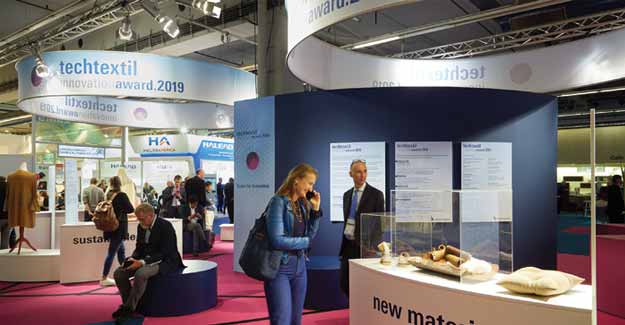
Innovations At Techtextil And Texprocess
Winners of the Texprocess Innovation Awards 2019 The Texprocess Innovation Award 2019 for new and further technological developments in the field of textile processing was presented to four winners. All award-winning projects were showcased in a special exhibition at Texprocess, which concluded on May 17. Award winners in the 'New Technology' category The new M-TYPE DELTA sewing system made by Dürkopp Adler AG can be integrated into a fully digitalised sewing production line for automotive interiors, home upholstery, leather goods and technical textiles. Using digital solutions to the maximum extent, the machine guides the operator and continuously augments its functions and 'knowledge'. Vetron Typical Europe GmbH developed the Vetron Viper, an ultra-lightweight sewing system made using carbon components. The system weighs a total of six kg, including yarn corps and drive motor, which means a smaller and more cost-effective industrial robot can be used in the sewing process. Thus, the solution is compact, flexible and easy to install and remove. Award winners in the 'New Process' category Assyst GmbH has developed a 3D innovation process - a virtual decision-making aid for everyone involved - from designers in the creative phase, via product developers in the virtual fitting stage, to sales staff with a 3D in-store presentation. Lectra's fashion-on-demand technology, the first end-to-end solution for personalising fashions, automates on-demand production so that companies can now process several individual orders at the same time, including individualised apparel. In other words, individualised products can be delivered just as fast as standard articles. The winners of the Techtextil Innovation Awards 2019 Two awards in the 'Sustainability' category for the first time In the 'Sustainability' category, a Techtextil Innovation Award went to a working group comprising Comfil (Denmark), Chemosvit Fibrochem (Slovakia), the Fraunhofer Institute for Chemical Technology ICT (Germany), the Technical University of Denmark and Centexbel (Belgium) for BIO4SELF, fully bio-based, self-reinforced polymer composites based on PLA fibres. These composites can be used in the fields of automobile manufacturing, the sports industry and medical technology. The second award went to PICASSO, a joint venture of Portuguese project partners for the development of a coloration and functionalisation process for garments based on natural extracts from residues and/or species of mushrooms and plants, as well as enzymes. The project partners are the Centre for Nanotechnology and Smart Materials (CeNTI), the Tintex sustainable textiles company, spice and herb producer Ervital, biotech company Bioinvitro Biotecnologia and the CITEVE textile technology centre. Award winners in the 'New Technology' category Robert Bosch GmbH and H. Stoll AG developed a seamless, 3D flat-knitted glove made of sensor yarn that offers the wearer sensory and control functions on all fingers, e.g., for operating interfaces in man-machine interaction, for movement control in relation to augmented and virtual-reality applications or rehabilitation purposes in a medical setting. The glove provides the same level of wearing comfort as a conventional glove. Germany's Northwest Textile Research Centre's 'Textile Mining' project, is a functional textile that enables, for example, companies from the metal industry to recycle and recover noble metals, such as gold, platinum and palladium, from industrial waste water. Other project partners: Kayser Filtertech, Setex-Textilveredlung, Cornelsen Umwelttechnologie, Unimicron Germany and Wieland Edelmetalle (all from Germany). Award winners in the 'New Application' category German Institutes for Textile and Fibre Research Denkendorf (DITF) and Beira Interior University (DCTT) in Portugal have developed a spacesaving inductive charging coil for hybrid and electric vehicles, using high-tech knitting technology. Partnering DITF in this project is Robert Bosch GmbH. The E-Caption 2.0 smart and safe coat developed by the Beira Interior University in Portugal protects workers from excess radio-frequency signals while climbing antennas. Protection is given by a textile system that harvests energy and is connected to LEDs that indicate when the radiation level exceeds that recommended by the European Union. The project partner is the Aveiro Institute for Telecommunication. Award winners in the 'New Material' category Portugal's Sedacor cork processing company developed CORK-A-TEX, a new yarn made of cork. The new cork yarn is a flexible product made of a natural material and offers additional design opportunities for the fashion industry and interior furnishing.
Textile Excellence
If you wish to Subscribe to Textile Excellence Print Edition, kindly fill in the below form and we shall get back to you with details.












